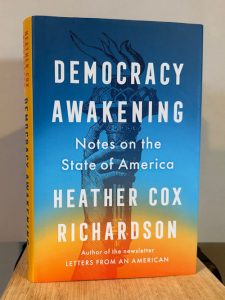Summary thoughts about this book.
Richardson tells the story of the past century, of the previous four years (before the book was published in 2019), and of the nation’s first century, in a matter-of-fact style that expresses not so much any kind of partisan position as it does the the development of conflicts between the founders, and those who’ve always opposed them, from first principles, as she, being a historian, understands them.
The admittedly compromised (since they owned slaves, among other things) ideals of the founders align with the ‘liberal consensus’ of the middle of the 20th century; those who’ve opposed them align with her definition of fascism, as being about people who think they are better than others and so should lead them, or be led by a dictator. This thread of superiority, by white European immigrants, flows naturally from the slave trade of the 17th century and the resultant racist attitudes that inform American life to this day. Which those conservatives don’t want to talk about, and excise or whitewash from their versions of American history, as being woke.
I read this book before I read the Lakoff book that I reviewed recently, but in reviewing the Richardson I see that it fits nicely with Lakoff’s characterizations of conservatives and progressives, of the former’s authoritarian culture and the latter’s culture of empathy and fairness. Really, they’re not the only ones; many of the books I’ve discussed in recent years describe similar contrasts, and conflicts throughout history. And Richardson’s “liberal consensus” matches nicely with Lakoff’s notion of a government that has a “moral mission” to provide protection, and empowerment, something the authoritarians dismiss as socialism (never mind anything Jesus said).
My own take, of course, is that this conflict reflects two end of a spectrum of human nature: the basic, daresay primitive, tribal human nature, evolved over a million or more years for life in small groups led by authoritarian leaders and expressing fear and disdain of other tribes, at one end; and the more cosmopolitan, daresay advanced, human nature that is egalitarian and empathetic and has necessarily evolved, albeit over a much shorter time, to enable modern humans the ability to get along with one another in an increasingly crowded world. Richardson avoids simple labels, except perhaps democratic and fascist, but her dichotomy maps well with those of the various other writers I’ve read in recent years.
A couple key historical points she makes that modern conservatives seem to have conveniently forgotten about: the Democratic and Republican parties switched attitudes about racial matters sometime in the mid-20th century (so it’s disingenuous for modern Republicans to claim Lincoln as a member of their party); and Reagan’s supply-side economics never worked out (despite Republican presidents persistently cutting taxes for the wealthy as if they did, or do).
I reflect again on my recent comment about what it is conservatives think they’re conserving. Generally, it seems, whatever existed prior to efforts to establish the values of the Constitution and that liberal consensus. The anti-democratic past, when life was hierarchical and white men rules everyone. That’s why Trump is now looking back at McKinley, from an era before the liberal consensus began. MAGA is basically anti-democratic (and of course anti-scientific).
Final thought, a recurring one on this blog. The range in political attitudes reflect the range of human nature, from dogmatic and disciplinary to empathetic and inquisitive. So these political swings will never go away.






